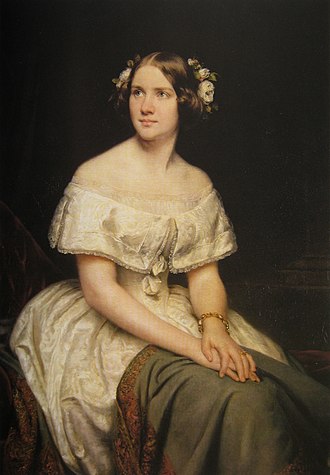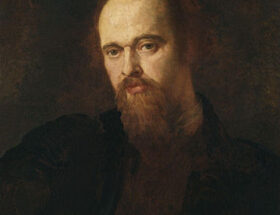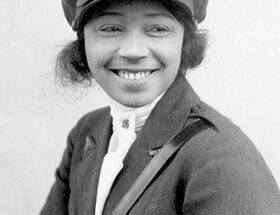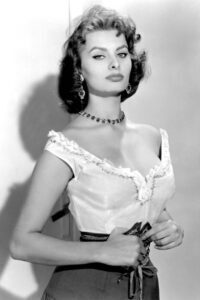Early life

Born on October 6, 1820, in Klara in central Stockholm, Sweden, Johanna Maria Lind was the illegitimate daughter of Niclas Jonas Lind, a bookkeeper, and Anne-Marie, a schoolteacher.
Jenny’s mother had divorced her first husband for adultery but refused to remarry until after his death in 1834. Jenny’s parents married when she was 14.
Anne-Marie ran a day school for girls out of her home. When Jenny was about 9, her singing was overheard by the maid of Mademoiselle Lundberg, the principal dancer at the Royal Swedish Opera.
The maid, astounded by Jenny’s extraordinary voice, returned the next day with Lundberg, who arranged an audition and helped her gain admission to the Royal Dramatic Training Academy, the acting school of the Royal Dramatic Theatre, where she studied with Carl Magnus Craelius, the singing master at the theatre.
Jenny began to sing onstage when she was 10. She had a vocal crisis at the age of 12 and had to stop singing for a time, but she recovered.
Her first great role was Agathe in Weber’s Der Freischütz in 1838 at the Royal Swedish Opera.
At 20, she was a member of the Royal Swedish Academy of Music and court singer to the King of Sweden and Norway.
Jenny’s voice became seriously damaged by overuse and untrained singing technique, but her career was saved by the singing teacher Manuel García with whom she studied in Paris from 1841 to 1843. He insisted that she should not sing at all for three months, to allow her vocal cords to recover, before he started to teach her a healthy and secure vocal technique.
After Jenny had been with García for a year, the composer Giacomo Meyerbeer, an early and faithful admirer of her talent, arranged an audition for her at the Opéra in Paris, but she was rejected.
The biographer Francis Rogers concludes that Jenny strongly resented the rebuff: when she became an international star, she always refused invitations to sing at the Paris Opéra.
Jenny returned to the Royal Swedish Opera, greatly improved as a singer by García’s training. She toured Denmark where, in 1843, Hans Christian Andersen met and fell in love with her.
Although the two became good friends, she did not reciprocate his romantic feelings. Jenny is believed to have inspired three of his fairy tales: “Beneath the Pillar”, “The Angel” and “The Nightingale”.
He wrote, “No book or personality whatever has exerted a more ennobling influence on me, as a poet, than Jenny Lind. For me she opened the sanctuary of art.”
The biographer Carol Rosen believes that after Jenny rejected Andersen as a suitor, he portrayed her as The Snow Queen with a heart of ice.
Success in Britain & Germany
In December 1844, through Meyerbeer’s influence, Jenny was engaged to sing the title role in Bellini’s opera Norma in Berlin.
That led to more engagements in opera houses throughout Germany and Austria, but such was her success in Berlin that she continued there for four months before she left for other cities.
Among her early admirers were Robert Schumann, Hector Berlioz and, most importantly for her, Felix Mendelssohn.
Ignaz Moscheles wrote: “Jenny Lind has fairly enchanted me… her song with two concertante flutes is perhaps the most incredible feat in the way of bravura singing that can possibly be heard”.
That number, from Meyerbeer’s Ein Feldlager in Schlesien (The Camp of Silesia, 1844, a role written for Jenny but not premiered by her) became one of the songs most associated with Jenny and she was called on to sing it wherever she performed in concert.
Her operatic repertoire included the title roles in Lucia di Lammermoor, Maria di Rohan, Norma, La sonnambula and La vestale as well as Susanna in The Marriage of Figaro, Adina in L’elisir d’amore and Alice in Robert le diable.
About that time, Jenny became known as “the Swedish Nightingale”. In December 1845, the day after her debut at the Leipzig Gewandhaus under the baton of Mendelssohn, she sang without fee for a charity concert in aid of the Orchestra Widows’ Fund.
Jenny’s devotion and generosity to charitable causes remained a key aspect of her career and greatly enhanced her international popularity even among the unmusical.
At the Royal Swedish Opera, Jenny had been friends with the tenor Julius Günther. They sang together both in opera and on the concert stage and became romantically linked by 1844. Their schedules separated them, however, as Günther remained in Stockholm and then became a student of Garcia in Paris in 1846–1847.
After reuniting in Sweden, according to Jenny’s 1891 Memoir, they became engaged to marry in the spring of 1848, just before Jenny returned to England. However, the two broke off the engagement in October of the same year.
After a successful season in Vienna, where she was mobbed by admirers and feted by the Imperial Family, Jenny traveled to London and gave her first performance there on 4 May 1847, when she appeared in an Italian version of Meyerbeer’s Robert le diable. It was attended by Queen Victoria. The next day, The Times wrote:
We have had frequent experience of the excitement appertaining to “first nights”, but we may safely say, and our opinion will be backed by several hundreds of Her Majesty’s subjects, that we never witnessed such a scene of enthusiasm as that displayed last night on the occasion of Mademoiselle Jenny Lind’s début as Alice in an Italian version of Robert le diable.
Queen Victoria attended each of Jenny’s sixteen debut performances in London. In July 1847, Jenny starred in the world première of Verdi’s opera I masnadieri at Her Majesty’s Theatre, under the baton of the composer.
During her two years on the operatic stage in London, Jenny appeared in most of the standard opera repertory.
In early 1849, still in her twenties, Jenny announced her permanent retirement from opera. Her last opera performance was on 10 May 1849 in Robert le diable, with Queen Victoria and other members of the Royal Family in attendance.
Jenny’s biographer Francis Rogers wrote: “The reasons for her early retirement have been much discussed for nearly a century, but remain today a matter of mystery. Many possible explanations have been advanced, but not one of them has been verified”.
Association with Mendelssohn
In London, Jenny’s close friendship with Mendelssohn continued. There had been claims that their relationship was more than friendship.
In 2013, George Biddlecombe confirmed in the Journal of the Royal Musical Association that:
“The Committee of the Mendelssohn Scholarship Foundation possesses material indicating that Mendelssohn wrote passionate love letters to Lind entreating her to join him in an adulterous relationship and threatening suicide as a means of exerting pressure upon her, and that these letters were destroyed on being discovered after her death.”
Mendelssohn was present at Jenny’s London debut in Robert le diable, and his friend, the critic Henry Chorley, who was with him, wrote: “I see as I write the smile with which Mendelssohn, whose enjoyment of Mdlle. Lind’s talent was unlimited, turned round and looked at me, as if a load of anxiety had been taken off his mind. His attachment to Mademoiselle Lind’s genius as a singer was unbounded, as was his desire for her success.”
Mendelssohn worked with Jenny on many occasions and wrote the beginnings of an opera, Lorelei, for her, based on the legend of the Lorelei Rhine maidens, but the opera was unfinished at his death. He composed the soprano aria in his oratorio Elijah (“Hear Ye Israel”) with Jenny’s voice in mind, focusing the tessitura of the aria around F-sharp (F♯5), a note in her range that Mendelssohn supposedly found irresistibly charming.
Four months after her London debut, Jenny was devastated by the premature death of Mendelssohn in November 1847. She did not at first feel able to sing the soprano part in Elijah, which he had written for her. Jenny finally did so at a performance in London’s Exeter Hall in late 1848, which raised £1,000 to fund a musical scholarship as a memorial to him. It was her first appearance in oratorio.
The original intention had been to found a school of music in Mendelssohn’s name in Leipzig, but there was not enough support there.
With the help of Sir George Smart, Julius Benedict and others, Jenny eventually raised enough money to fund a scholarship “to receive pupils of all nations and promote their musical training”.
The first recipient of the Mendelssohn Scholarship was the 14-year-old Arthur Sullivan, whom Jenny encouraged in his career.
American tour
In 1849, Jenny was approached by the American showman P. T. Barnum with a proposal to tour throughout the United States, giving 150 concerts in eighteen months.
Realising that it would yield large sums for charity, particularly the endowment of free schools in her native Sweden, Jenny demanded a fixed fee of $1,000 per concert and in January 1850 Barnum agreed.
Together with a supporting baritone, Giovanni Belletti and her London colleague, Julius Benedict, as pianist, arranger and conductor, Jenny sailed to America in September 1850. Barnum’s advance publicity made her a celebrity even before she arrived in the US and she received a wild reception on arriving in New York.
Tickets for some of her concerts were in such demand that Barnum sold them by auction. The enthusiasm of the public was so strong that the American press coined the term “Lind mania”.

Autograph of Lind after her marriage to Otto Goldschmidt
After her first two performances in New York in September 1850, Jenny’s party toured the east coast of America, with continued success, and later took in Cuba, the Southern US and Canada.
By early 1851, Jenny had become uncomfortable with Barnum’s relentless marketing of the tour and she invoked a contractual right to sever her ties with him; they parted amicably.
She continued the tour for nearly a year, under her own management, until May 1852. Benedict left the party in 1851 to return to England and Jenny invited Otto Goldschmidt to replace him as pianist and conductor.
Jenny and Goldschmidt were married on 5 February 1852, near the end of the tour, in Boston. She took the name “Jenny Lind-Goldschmidt”, both privately and professionally.
Details of the later concerts under her own management are scarce, but it is known that under Barnum’s management Jenny gave 93 concerts in America for which she earned about $350,000, and he netted at least $500,000 ($10.9 million and $15.6 million, as of 2021, respectively).
Jenny donated her profits to various charities, including free schools in Sweden and some US charities.
At the time of her tour, the debate over slavery in the United States had been intensified by the Compromise of 1850. American abolitionists attempted to secure Jenny’s support for their cause, but she refused to comment on the institution.
After meeting Jenny in July 1851, British abolitionist Judith Griffiths wrote that “the colored people are regarded by her as beneath humanity – and too unworthy to be educated… She seemed horrified at colored people – I now know for myself that she is thoroughly pro-slavery – I am so grieved.”
Abolitionist lawyer Maunsell Field wrote that “she had an abhorrence for negroes she could not overcome. ‘They are so ugly’, she used to say.” Yet in June 1852, Jenny donated $100 to Harriet Beecher Stowe to free the Edmonsons, a Black family enslaved in Washington, D.C., praising Uncle Tom’s Cabin as “having been a strong means in the Creator’s hand of operating essential good in one of the most important questions for the welfare of our black brethren.”
Historian Joan D. Hedrick suggested that Stowe’s book “may have changed Lind’s heart”.
Later years
Jenny and Goldschmidt returned to Europe together in May 1852. They lived first in Dresden, Germany, and, from 1855, in England for the rest of their lives. They had three children: Otto, born September 1853 in Germany, Jenny, born March 1857 in England, and Ernest, born January 1861 in England.
Although Jenny refused all requests to appear in opera after her return to Europe, she continued to perform in the concert hall.
In 1856, at the invitation of the Philharmonic Society conducted by William Sterndale Bennett, she sang the chief soprano part in the first English performance of the cantata Paradise and the Peri by Robert Schumann.
In 1866, she gave a concert with Arthur Sullivan at St James’s Hall. The Times reported, “there is magic still in that voice… the most perfect singing – perfect alike in expression and in vocalization… Nothing more engaging, nothing more earnest, nothing more dramatic can be imagined.”
At Düsseldorf in January 1870, she sang in Ruth, an oratorio composed by her husband. When Goldschmidt formed the Bach Choir in 1875, Jenny trained the soprano choristers for the first English performance of Bach’s B minor Mass in April 1876 and performed in the mass.
Her concerts decreased in frequency until Jenny retired from singing in 1883.
From 1879 until 1887, Jenny worked with Frederick Niecks on his biography of Frédéric Chopin.
In 1882, she was appointed professor of singing at the newly founded Royal College of Music. Jenny believed in an all-round musical training for her pupils, insisting that, in addition to their vocal studies, they were instructed in solfège, piano, harmony, diction, deportment and at least one foreign language.
Her students included German singer and composer Georgina Schubert.
Jenny lived her final years at Wynds Point, Herefordshire, on the Malvern Hills near the British Camp.
Her last public appearance was at a charity concert at Royal Malvern Spa in 1883.
Jenny died, aged 67, at Wynds Point on 2 November 1887 and was buried in the Great Malvern Cemetery to the music of Chopin’s Funeral March.
She bequeathed a considerable part of her wealth to help poor Protestant students in Sweden receive an education.


